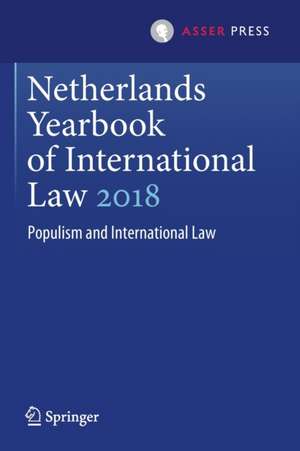Netherlands Yearbook of International Law 2018: Populism and International Law: Netherlands Yearbook of International Law, cartea 49
Editat de Janne E. Nijman, Wouter G. Werneren Limba Engleză Paperback – 30 oct 2020
This volume of the Netherlands Yearbook of International Law explores the many faces of populism, and the different manifestations of the relationship between populism and international law. Rather than taking the so-called populist backlash against globalisation, international law and governance at face value, this volume aims to dig deeper and wonders ‘What backlash are we talking about, really?’. While populism is contextual and contingent on the society in which it arises and its relationship with international law and institutions thus has differed likewise, this volume assists in our examination of what we find so dangerous about populism and problematic in its relationship with international law.
| Toate formatele și edițiile | Preț | Express |
|---|---|---|
| Paperback (1) | 641.53 lei 6-8 săpt. | |
| T.M.C. Asser Press – 30 oct 2020 | 641.53 lei 6-8 săpt. | |
| Hardback (1) | 897.33 lei 6-8 săpt. | |
| T.M.C. Asser Press – 30 oct 2019 | 897.33 lei 6-8 săpt. |
Din seria Netherlands Yearbook of International Law
- 18%
 Preț: 1231.64 lei
Preț: 1231.64 lei - 27%
 Preț: 1449.70 lei
Preț: 1449.70 lei - 27%
 Preț: 1357.63 lei
Preț: 1357.63 lei - 27%
 Preț: 2165.55 lei
Preț: 2165.55 lei - 15%
 Preț: 654.30 lei
Preț: 654.30 lei - 20%
 Preț: 584.19 lei
Preț: 584.19 lei - 15%
 Preț: 650.69 lei
Preț: 650.69 lei - 15%
 Preț: 663.27 lei
Preț: 663.27 lei - 18%
 Preț: 971.49 lei
Preț: 971.49 lei - 15%
 Preț: 664.11 lei
Preț: 664.11 lei - 15%
 Preț: 661.84 lei
Preț: 661.84 lei - 15%
 Preț: 664.61 lei
Preț: 664.61 lei - 15%
 Preț: 658.70 lei
Preț: 658.70 lei - 15%
 Preț: 651.02 lei
Preț: 651.02 lei - 15%
 Preț: 653.14 lei
Preț: 653.14 lei - 20%
 Preț: 557.76 lei
Preț: 557.76 lei - 15%
 Preț: 644.95 lei
Preț: 644.95 lei - 15%
 Preț: 644.30 lei
Preț: 644.30 lei - 15%
 Preț: 653.14 lei
Preț: 653.14 lei - 18%
 Preț: 959.82 lei
Preț: 959.82 lei - 18%
 Preț: 1229.91 lei
Preț: 1229.91 lei - 18%
 Preț: 895.76 lei
Preț: 895.76 lei - 18%
 Preț: 952.26 lei
Preț: 952.26 lei - 18%
 Preț: 953.65 lei
Preț: 953.65 lei
Preț: 641.53 lei
Preț vechi: 754.74 lei
-15% Nou
Puncte Express: 962
Preț estimativ în valută:
122.79€ • 132.54$ • 102.96£
122.79€ • 132.54$ • 102.96£
Carte tipărită la comandă
Livrare economică 18 aprilie-02 mai
Preluare comenzi: 021 569.72.76
Specificații
ISBN-13: 9789462653337
ISBN-10: 946265333X
Pagini: 305
Ilustrații: XIII, 305 p. 2 illus.
Dimensiuni: 155 x 235 mm
Greutate: 0.45 kg
Ediția:1st ed. 2019
Editura: T.M.C. Asser Press
Colecția T.M.C. Asser Press
Seria Netherlands Yearbook of International Law
Locul publicării:The Hague, Germany
ISBN-10: 946265333X
Pagini: 305
Ilustrații: XIII, 305 p. 2 illus.
Dimensiuni: 155 x 235 mm
Greutate: 0.45 kg
Ediția:1st ed. 2019
Editura: T.M.C. Asser Press
Colecția T.M.C. Asser Press
Seria Netherlands Yearbook of International Law
Locul publicării:The Hague, Germany
Cuprins
Part I. Populism and International Law.- Chapter 1. Populism and International Law: What Backlash and Which Rubicon?.- Chapter 2. Trump, International Trade, and Populism.- Chapter 3. Populist Paranoia and International Law.- Chapter 4. Is There a ‘Populist’ International Law (In Latin America)?.- Chapter 5. Populism, International Law and the End of Keep Calm and Carry on Lawyering.- Chapter 6. People, Politics and Populism in International Criminal Law: The Mungiki as Kenyan Ethnos and Kenyan Demos.- Chapter 7. Democracy and Human Rights.- Chapter 8. Reclaiming the Keys to the Kingdom (of the World): Evangelicals and Human Rights in Latin America.- Chapter 9. Addressing Economic Populism Through Law – A Case Study of the World Development Report 2017.- Part II. Dutch Practice.- Chapter 10. Climate Action as Positive Human Rights Obligation: The Appeals Judgment in Urgenda v The Netherlands.- Chapter 11. Pursuing Justice for MH17: The Role of the Netherlands.- Chapter 12. What a Drag(net): Dutch Surveillance Laws in the Light of European Union Data Protection Law.- Table of cases.- Index.
Textul de pe ultima copertă
This volume of the Netherlands Yearbook of International Law explores the many faces of populism, and the different manifestations of the relationship between populism and international law. Rather than taking the so-called populist backlash against globalisation, international law and governance at face value, this volume aims to dig deeper and wonders ‘What backlash are we talking about, really?’. While populism is contextual and contingent on the society in which it arises and its relationship with international law and institutions thus has differed likewise, this volume assists in our examination of what we find so dangerous about populism and problematic in its relationship with international law.
Caracteristici
Provides a unique exploration of populism and its relationship with international law Analyses the many faces of populism and goes beyond the mere ‘backlash’ rhetoric Includes contributions on recent developments regarding Dutch practice in international law
